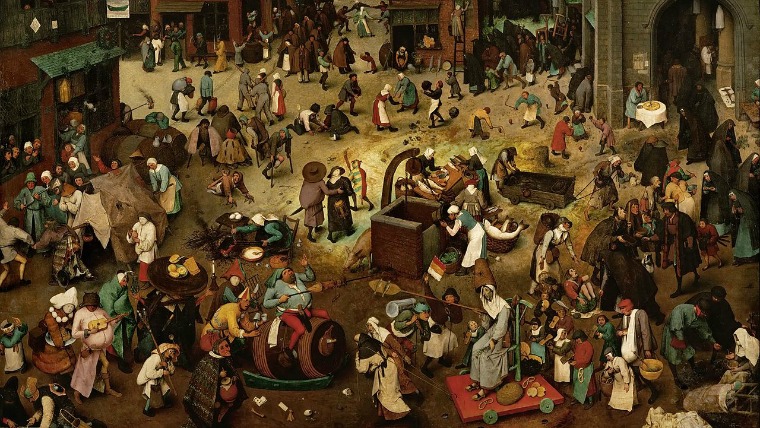‘Sooner or later, February is carnival time’ and 24 more carnival proverbs
28/01/2024 - 08:06
‘Carnival fifteen times a year and Christmas once a month, oh that every day were Easter and Lent would never come’. This popular proverb describes very well the best loved festivals on the calendar, and carnival comes top of the list. This festival, characterised by transgression, the switching of roles, rowdy behaviour and recklessness, is one of the most widely referred to in proverbs. Sometimes they simply describe the characteristics of the festival, but as proverbs are a good moralising tool, some also dedicate a lot of space to explaining that the consequences of so many excesses can be harmful.
Carnival, a lawless festival
At carnival time, for a whole week the established order is turned on its head and this is why it is often said that ‘at carnival time, anything goes’. This temporary disorder can be entertaining, but we also need to be alert because the proverbs warn that ‘at carnival time, all beasts run free’.
Carnival is also a festival in which roles are turned on their head and, hidden behind a mask or disguise, everyone can say what they think. This is why ‘at carnival time, everyone is equal’. Therefore, at carnival time, everyone takes part but not always on equal terms: ‘Cool carnival, wheat at eighteen, how many dance with an empty stomach’.
In a temporary situation of disorder and rowdiness, it is particularly important not to take to heart everything that happens during this festival: ‘Take no notice at all of carnival’. Even if we’ve really let ourselves go and we’ve ended up getting married, we shouldn’t suffer because ‘a carnival wedding is a wedding that is worth nothing’ Because anything that happens during carnival is only legally and morally valid within the context of the festival itself.
However, carnival is a festival with a clearly defined start and finish. And when it’s over, everything goes back to normal. So, if you carry on partying into Lent, you’ll be branded a loon: ‘To the crazy man, it’s carnival all year long’ or ‘ He who is over the hill, all year long celebrates carnival’ And if we don’t know how to stop, we might have ‘a Carnival ending’, which means things ending very badly, because at the end of the festive season, the Carnival King ends up being burned.
The seven capital sins… and their consequences
At carnival time, you can do everything that, at any other time of the year, is frowned upon or considered morally reprehensible. This is why it’s easy to let yourself go and give in to all manner of excesses, feasting, drinking, carnal… So it is said that: ‘For Carnival, more wine than bread’, ‘At carnival time, lots of wine and lots of fools’ or ‘Any meat not put away for Carnival is not meat but mud’.
However, so many festive excesses come at a price. And those who have to pay for it are bound to be sad, they will put on ‘a Maundy Thursday face but they’ll be presenting Carnival events’ Sometimes the price is economic: ‘Carnival Tuesday is a fun day: it cleans out our pockets and makes us happy in bed.’ And sometimes it takes the form of family troubles: ‘When the father celebrates Carnival, the children do Lent.’
However, there is one consequence that is often highlighted in proverbs: unwanted pregnancies. There are a whole series of proverbs that warn that the consequences are not immediate, but will show themselves after nine months: ‘The sins of Carnival come out on All Saints day’, ‘Carnival dances come out on All Saints day’, ‘The craziness sown during Carnival is reaped on All Saints Day’, ‘Carnival jokes come to light on All Saints day’, ‘Carnival laughter, All Saints tears’.
What’s more, in the olden days, consummations and pregnancies always tended to lead to forced marriage: ‘Carnival with the lady, Easter with the pastor’, ‘Carnival love, rebellious marriage’.
